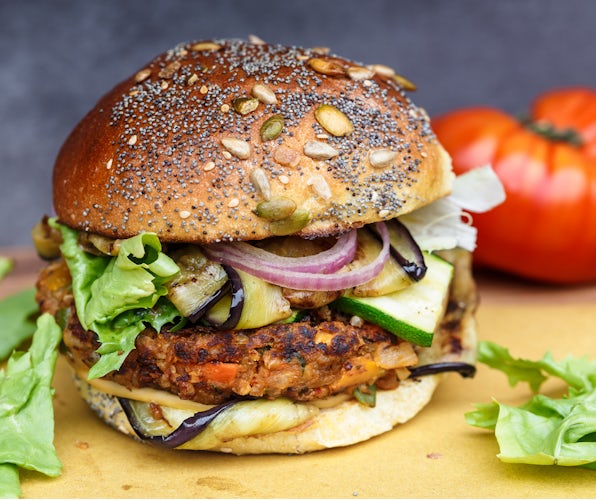Birds Eye hopes vampires will help take its new meat-free range mainstream
Birds Eye is launching a £2m marketing push on its recently launched range of meat-free burgers, sausages and meatballs as it looks to broaden the appeal of meat alternatives among families.
 Birds Eye is launching a £2m marketing campaign to drive awareness and penetration of its newly-launched Green Cuisine range of meat-free products as it looks to bring the category to a more mainstream audience.
Birds Eye is launching a £2m marketing campaign to drive awareness and penetration of its newly-launched Green Cuisine range of meat-free products as it looks to bring the category to a more mainstream audience.
The Green Cuisine range is currently made up of three products – burgers, sausages and meatballs – that are major segments in the meat-free market that replicate meat products. The sector is growing rapidly, with the meat-free frozen market seeing sales growth of 15% a year, according to Birds Eye, and now worth £160m annually, more than the frozen red meat market, which is worth around £100m.
However, frozen meat-free products are currently only bought by around 35% (nine million) of British households, while Birds Eye is present in 75% of households, presenting the company with a clear opportunity in an “attractive” segment, according to marketing director Steve Challouma. It also over-indexes among pre-family households, with 22% of volume sales coming from this customer demographic compared to 10% of frozen food sales overall.
“As a familiar mainstream British brand, our ambition is to open up the segment into the mainstream and drive growth of the category among families,” he tells Marketing Week.
“This is one of those markets that continues to grow and a rising tide lifts all ships. We intend to aggressively expand the range with more meat-free and vegetarian products, maybe making Green Cuisine the platform [to do this] so we have a [brand] architecture that is very clear for the shopper in-store and can benefit from the support model.”
The more we entertain and engage consumers in the message and product, the more chance there is they will remember that message and Birds Eye will stand out.
Steve Challouma, Birds Eye
While Birds Eye sees a clear opportunity, this is a highly competitive sector with both established brands such as Quorn and Linda McCartney and insurgents like Beyond Meat, The Meatless Farm Company and Strong Roots looking to grab market share. Birds Eye is hoping to differentiate its products in a few ways.
Firstly, the Green Cuisine range is manufactured from pea protein, rather than the soya or mycoprotein used in most products, which Birds Eye hopes will make it “distinctive” and chimes with its history in selling peas. Secondly, it is putting the focus on nutrition, guaranteeing its products will be better for consumers than the meat alternative. This isn’t always the case currently, with many meat-free products still high in saturated fat.
Veganism on the rise: How retailers are responding to the growing appetite for plant-based food
Thirdly, is how Birds Eye is communicating its range. It is taking a much more traditional FMCG launch approach with a £2m campaign that will feature across mass media, as opposed to the challenger brands’ strategy that tends to focus on building brand reputation through digital and social.
Engaging customers through ad creative
The creative will focus on “entertaining and engaging” customers, rather than a “preachy” message, which Challouma believes people get enough of from the press, the government and public bodies.
“The more we can entertain and engage consumers in the message and the product, the more chance there is they will remember that message and Birds Eye will stand out,” he says.
“In the past, Birds Eye has been at is best and achieved cut-through and memorability when we have entertained the nation with our messages, when there is a touch of zaniness and theatre in our advertising.”
The campaign, created by agency Grey London, takes a tongue-in-cheek approach to meat-free burgers. Under the strapline ‘Whoops, I’m a bit veggie!’, the main TV ad shows vampires attending a convention where they accidentally eat meat-free burgers and are shocked to find they have enjoyed them.
The TVC will be supported by PR and digital activity, as well as a strong presence in shopper channels in-store and online. The aim is to drive awareness, trial and ultimately penetration of the range, with promotions aiming to boost physical and mental availability.
The campaign is part of a wider shift by Birds Eye to focus on its plant-based and vegetables ranges. Just in the second half of this year it is planning to spend £8.4m on this sector, including on peas, Green Cuisine and its veggie bowl range, double its budget last year.
That will help Birds Eye in its wider strategy to move its business more into healthy categories. Twenty years ago, healthier categories made up around 60% of its volume sales but that figure is now at around 80% and that is expected to grow further.
“The intention is to build this into a major fourth leg of the Birds Eye brand – after fish, chicken and vegetables. Internally, we are calling this a vegetarian revolution,” explains Challouma.
While Challouma admits that putting more effort into sustainable and healthy categories “feels like a great thing to do as a marketer”, there is also a business case for it. Profit margins on healthier categories like vegetables are higher, meaning orientating the portfolio towards this sector should lead to Birds Eye being a “more successful business”.
“We are on a broader journey to modernise frozen foods focused on the trends of health and sustainability,” he concludes. “As a commercial organisation we have a responsibility to make profit for shareholders but we can achieve that goal by fulfilling our social and environmental responsibilities too. If we orient more [towards vegetarian and vegan] it makes great commercial sense, that is a really great place to be.”







